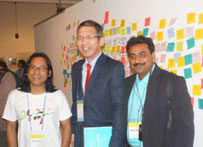Last May 16-18, 2016, The May 18 Memorial Foundation hosted a successful annual event, the Gwangju Asia Forum under the theme of “State Violence and Historical Distortion.” Here are some of the valuable voices from the participants.
A Magnificent Inspiration for Pakistan: The May 18 Gwangju Democratic Uprising in Korea
Maqbool Ahmed
Executive Director, Research and Development for Human Resources (RDHR), Pakistan
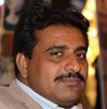
Maqbool Ahmed
Thus, I started onlinereading about the May 18 Democratic Struggle of Gwangju;and during my online reading I found that it was the Korean movement and struggle for democracy and against the dictatorship of military General Chun Du-Hwan in 1980. When I read further, it revealed similarities with the dictatorship in Pakistan of General Zia in 1980.
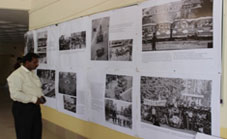
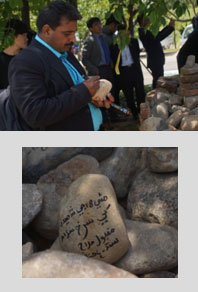
The Unknown Movement of Asia: the May 18 Democratic Movement of Gwangju.
It is very important for Pakistani and global readers that they should know what theobjective and background of the May 18 Democratic Uprising. In 1980 the Gwangju commune, especially Chonnam National University students came together and raised their voiceagainst the military dictatorship of General Chun Doo-Hwan. They were startinga peaceful resistant to demand restoration of democracy in Korea.Let me share some details of the uprising with you.It started with the December 12, 1979 coup by Chun Doo-Hwan's military junta who occupied the Chonnam Provincial Hall with armed forces sent to Gwangju by the Martial Law Enforcement Headquarters. After the assassination of President Park Chung-hee, a group of politically minded soldiers undertook Operation Chungjung (Operation True Heart) to quell The Uprising in Gwangju. In this way, the Fifth Republic came into existence. However, later common citizens, workers, bus drivers, taxi drivers, and mothers joined this struggle. The city of Gwangju was totallycordon and sealed by the military. The Gwangju citizens took control of city but one thing should be noted that during citizen’s rule; Gwangju remained peaceful, public law was in, and there was no single incident reported about crime, looting, and torching of cars or buildings. The mothers and sisters of Gwangju city came to help each other and they shared their rice and food with each other and developed harmonization in the city. The Gwangju citizens were united for the promotion of democratization and human rights, and were only demanding the end of authoritarianism in Korea. With peaceful demonstrations and resistance of the citizens of Gwangju, the military regime responded oppositely and they used brutal force to end the resistance of citizens.

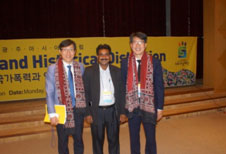
For my international readers, I would like to share with you that in the 1980’s Pakistan had also a similar situation and were faced with military dictatorships. Pakistan faced the world’s longest existing authoritarian regimes, which pushed this country towards turmoil and radicalization. In 1981 the Pakistani people came on the streets and organized an uprising named“The Movement for the Restoration of Democracy” against the dictatorship of General Zia.It was started by left wing students and later got supported by political parties, and my province Sindh was the hub of this movement. But unfortunately the military regime of Zia brutally quelledthe first weeks of the movement and, as a result, 1999 people were arrested, 189 killed, and 126 injured. However, in the end he announceda restoration plan of democracy. However, due to the presence of a strong military Pakistan, the people of Pakistan are unable to get a real and functional democracy.
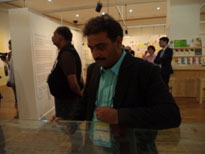
2016 Gwangju Asia Foruma tribute to martyrs Gwangju Citizens: Platform for Human Rights Activists:
On 25th April 2016, Igot an invitation letter from the May 18 Memorial Foundation to attend the 2016Gwangju Asia Forum. The Gwangju Asia Forum is annually held since 1999 to mark the May 18 Democratic Movement of 1980. This is an opportunity for activists to exchange and share their experiences of state power, shrinking space of democratization, regional conflict, development of human rights, enhancement of regional solidarity, residential welfare, environment, peace in the Korean peninsula, and democracy in Asia, and to come up with solutions and facilitate a network of civil societies. It also shows us that the May 18 Foundation and Gwangju citizens are still committed to the May 18 spirit and that they are highlighting and advocatingdemocratization, human rights, and peace especially in Asia but also all over the globe. This Forum also provides a great sharing and communicating mood to highlight advocacyfor human rights and especiallydemocratization in Asia and globally. This time the theme of the Gwangju Asia Forum was State Violence and Historical Distortion, and the May 18 Memorial Foundation highlighted state accountability and also emphasis on teachingreal history to Korean children. It is very important that citizens always keep an eye on accountability of state affairs, to monitor the states activities, and to guide the state by the public vision. This is the main step that the May 18 Foundation is taking and it is pushing the state to consider people’s rights and the worth of their freedom. Thus, this isaplatform that is also very important to the Korean public as well as to international citizens. It inspired me to see how the Korean peoples were committed to democracy and freedom in Asia and the world.Thematic areas Gwangju Asia Forum: A Global Advocacy for Democracy and Justice.
It was really an interesting point for me that the May 18 Memorial Foundation turned the Gwangju Asia Forum intoa Global advocacyforum, which especially focused on promotion of democracy and justice in Asia and the globe. TheGwangju Asia Forum was mainly divided into four major advocacy thematic areas.- 1: Solidarity of Democratization Movements in Asia (SDMA)
- 2: Solidarity For Social Justice (SFSJ)
- 3: Grassroots organization session
- 4: Torture, Rehabilitation of State Violence Survivors, and Social Justice
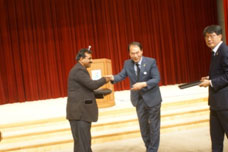
1: Solidarity of Democratization Movements in Asia (SDMA)
Let me share with you SDMA objectives as it is an important network supporting human rights defenders and in discussing democratization issues in Asia. In particular, the Solidarity for Democratization Movements in Asia (SDMA) was launched at the 2010 Gwangju Asia Forum with 7 groups participating from 5 countries. The driving forces of the Gwangju Asia Forum and SDMA's activities have ranged from setting the main theme of the Forum to conducting specific activities for the solidarity of civil societies both locally and globally. This year 2016, a total seven countries participated in this event: Pakistan, Bangladesh, Maldives, Indonesia, Thailand, Myanmar and Sri Lanaka. The SDMA participants shared their experiences of the regressive trends of democracy in their particular countries. The overall situation of democratization in these countries was alarming and the rights of citizens were restricted. A Bangladeshi colleague shared that the state is mainlyrestricting freedom of speech and freedom of association. By threat and repression, the Bangladeshi Government was also penalizing those human rights defenders who are highlighting these issues. Similarly, Maldivian participants shared their story that the state is pushing democracy into a corner and supporting religiousradicalization, which are significant threats to the country. I have shared the present situation of Pakistan as follows. It is also facing a soft military coup, terrorism, sectarian war; the freedom of speech is also in turmoil and intolerance; the corruption and dysfunctional democracy are creating hurdles in the democratization system of Pakistan. All remaining participants highlighted similar issues in their countries. My main findings were that the Asian region is facing a shrinking of democracy and right of freedom space in their countries. The SDMA platform also providedan advocacy plan to counter such activities and issued guidance statements to individual countries. It also inspired me that the May 18 Democratic Movement turned into an international policy system and the credit goes to the May 18 Memorial Foundation.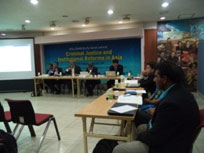
2: Solidarity For Social Justice (SFSJ)
We Pakistani witness that the Pakistan Justice system is outdated and that there are two parallel systems working in one country. The current world is very focused on their justice systems that are very effective in delivering their fruits to victims, which allow common people to trust their judicial system. The Korean judicial system is also strong, very responsive, and equal to international laws and that is why they are triumphant to deliver effectively and to build peoples’ trust in the system. The SFSJ participants also came from diverse Asian countries: Pakistan, Bangladesh, Philippines, Sri Lanka, Nepal, Hong Kong, Vietnam, Myanmar, and Indonesia. During this workshop I found that Pakistan wasthe only nation which is less trained in legal advocacy with burdens of increasing cases under the dual system of Sharia law and the law with British traces. Mostly, perpetrators take advantage of flaws in the system and exploit the system. Further, Pakistani police are also not very knowledgeable about the legal system of Pakistan and poorly educated assistant sub-inspector police officers are unable to develop FIR againstculprits and to understand the legal principals in their system, which causes justice to become insignificant and courts to become unable to decide justly for the victims. The Pakistan judicialsystemneeds very strong reforms in term of new laws, trained legal staff (court and police), and understandable judicial laws forthe common peopleto be able to read easily. Finally, it is important to usea computerized record system and various other modern reforms. I have observed that contrary to Nepal the Pakistani democratic system allowed military courts to affect a trial process, andpermitting executions, which are very serious threats to the civil judicial system. Thanks to the May 18 Memorial Foundation, I was allowed to represent the Pakistani cases and to share our concerns about it. I think that such workshops should be continued so that we advocateglobally for the common public to getrelief, to have access to afriendly justice, and to exercise their own rights.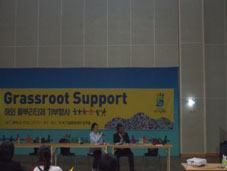
3: Grassroots organization session
It was amazing that the May 18 Memorial Foundation was keen to support grassroots organizations for the promotion of human rights, democratization, and peace. It is also worthwhile that the people of Korea and especially Gwangju citizens were united to uplift human rights globally. Seven countries participated in this event and most of them were small organizations, highlighting their scope of work and activities. Korean donors were interested and attentive to listen to our activities. Finally, the May 18 Memorial Foundation gave us laptops for our organizational capacitybuilding. That was really wonderful for my organization as we are lacking such important machines and thus unable to communicate easily. So, I am thankful from the core of my heart to the May 18 for assisting us with such expensive gifts.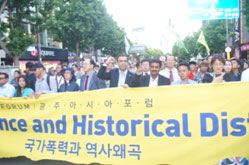
Paying tribute to martyrs of the May 18 Democratic Uprising at the National Cemetery of Gwangju
It was an interesting part of my life. We, the Pakistani, also have various activities but we forget these entirely, for example the MRD Movement, the Lawyers Movements and maybe many more. Pakistani society possesses ignorance and is ignorant; it doesn’tremember its past, its movements and itleads in military coups, feudalism, low literacy, a dysfunctional democratic system, and in violation of human rights. When Koreans commemorated, paidtheir respect to the heroes oftheir movements, developed the archive system to save the history of public events and built several national monuments to share all these precious struggles and spirit, they did these efforts for future generationsto enjoy while remembering the struggle for rights and to enjoy their own rights. Each international participant came with their native stone at the cemetery. They wrote and gave their tribute to martyrs of the May 18 Democratic Movement. Officially, the Prime Minster came to pay tribute and people carried their flags and sung songs for them. This commemoration shows how a nation pays tribute to their heroes, who gave their lives for a noble cause. Koreans build museums and public monuments and they are playing very important roles in the formation of a national memory and identity in Korean society, which is a magnificent example for the Pakistani nation and society.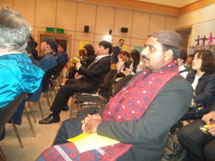
Gwangju Prize for Human Rights: Honor from a Society to Human Rights Activists
Let me share with you the background of the Gwangju Prize for Human Rights. In the past this award was known as the “May 18 Citizen’s Award”, which was established in 1991 by the Association of the Families of the May 18 Democratic Persons of Merit with the aim of nationalization of the May 18 spirit in Korea. The procedure for the Prize was one foran individual or one toan organization,not directly linked to the Uprising but working to reveal the truth of the May 18 Uprising. The “Yun Sang-won Award”, named after one of the leaders of the uprising, who sacrificed himself on 27 May in the Gwangju Provincial Office, the last battle field, was established by those who engaged in Yun’s commemoration event and by the bereaved family of Yun to award one individual or one organization who struggled for the resolution of the May 18 Democratic Uprising. Both awards were sent to the May 18 Memorial Foundation in 1998 to lift the reputation of the Prize and to widen the scope of the winner’sinto a world-wide and international one so they can support human rights, democratization, and peace all over world. The May 18 Memorial Foundation had also awarded this Prize to Pakistan’s renowned lawyer Mr. Muneer A Malik for his important role in the Lawyers Movement. This year’sspecial guest at the event was former president and freedom fighter Mr. XananaGusmao fromTimor Leste. The 2016 Gwangju Prize for Human Rights was awarded totwo co-recipients: Bersih 2.0 from Malaysia and Dr.Nguyen Dan Que from Vietnam. It was ruthless that both laureates were banned from traveling to receive their awards. Such actions showwhat kinds of threats, trauma and repression they are facing by the state. It also shows that the Gwangju citizens’ sprit for human rights and democratization is constantly flourishing in their hearts & minds, which should be praised and applauded from all of us and from the world.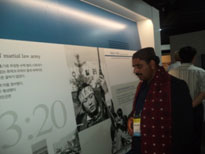
A Magnificent Inspiration for Pakistan: The May 18 Gwangju Democratic Movement
Over the decades, the world is rapidly changing and facing various awful and tremendous practices. My visit to Gwangju and Korea revealed to me that Korean developed their country and paid prominent and scrupulous honor to their past especially to the May 18 Democratic Movement. The Korean’s modern accomplishments and growing confidence have actually often served to strengthen its historical consciousness. They have, at times, served to activate, not assuage, people’s memory of past struggles for human rights and democratization. This is why it is very important for today’s people to understand the Korean’s historical consciousness, which is flourishing for a future generation and will allow them to stopsuch awful events in future.It is extremely important that we Pakistani as a nation should reevaluate and reassess our past and current struggle for human rights, development, and democratization. It is also significant we should learn a lesson from the KoreanMay 18 Democratic Movements, whose spirit is constantly thriving and spreading its aroma in the world. Through such activism and politicizing, we can bring real democracy and human rights protection to Pakistan. As you know, Pakistan has remained a victim for more than sixty years of authoritarian regimes. It badly affected all institutes, society, and a democratic system of Pakistan. We have to understand that democratization is a process and Pakistan has very young democratic system, which is still not vibrant but needs protection. Even now, the people of Pakistan have to undergo a long way in quest for true democracy leading to the ultimate goal of good governance.
